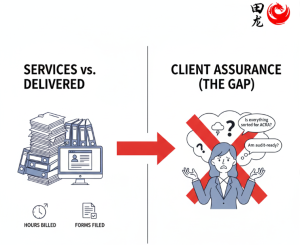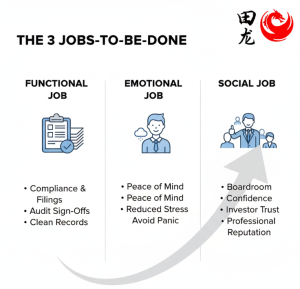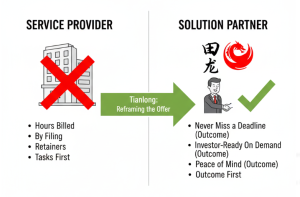Introduction
Most firms in our space, whether it’s audit, tax, or corp sec, are still stuck selling services. Services packaged by the hour, by the filing, by the retainer. And look, that’s fine, but clients these days don’t really want a service. They want an outcome. They want to be “investor-ready on demand” or to have “zero stress in audit season.” And that’s where this whole Jobs-to-be-Done (JTBD) mindset comes in. It’s not new, but for some reason, the profession is still lagging behind.
Why Services Alone Don’t Cut It

I’ve sat through too many boardroom conversations where the CFO rolls their eyes and says, “Yes, we have a corporate secretary, but I still don’t know if everything is sorted for ACRA.” That tells me something. The service is there, the invoice is paid, but the job-to-be-done isn’t actually complete.
Clients don’t want a stack of PDFs in their inbox. They want assurance, clarity, and maybe even some peace of mind.
Honestly, half the time the value isn’t in the technical work itself. It’s in removing the stress and uncertainty that comes with it. If your service doesn’t give them that, then they’ll start looking for alternatives. And increasingly, those alternatives aren’t the traditional firms.
The Functional, Emotional, and Social Jobs

So what jobs are clients actually hiring us to do? Functionally, it’s compliance, audit sign-offs, clean filings. Emotionally, it’s avoiding panic in March when deadlines converge. Socially, it’s the CFO being able to walk into the boardroom without fear of getting grilled.
Here’s what surprised me over the years. I once had a client who barely read the audit report. What mattered to her was being able to tell investors confidently, “We’ve passed audit, no issues.” That’s a social job, not a technical one. And you know what, that’s probably more important for her career than the technical detail.
From “Service Provider” to “Solution Partner”

Now, here’s where I might contradict myself. I used to think the differentiator was technical excellence. And to be fair, it still matters. But, when I see firms like Tianlong coming in with simple, low-retainer, pay-per-filing models, I start thinking… maybe the shift is more fundamental.
They’re not just making services cheaper. They’re reframing the whole offer as a solution: outcome-first, service-second.
Imagine this: Instead of paying $600 for secretarial “coverage,” you pay for “never missing a filing deadline again.” Same activity, different framing, but the latter speaks to the actual job clients are hiring you for.
The Audit Season Example

Let me give a simple anecdote. Picture audit busy season in Singapore. Deadlines piling up, teams stretched thin, clients calling frantically at 9 pm. We used to joke about “audit war rooms.” But if you frame the JTBD properly, the real promise is not an efficient audit file. It’s “zero stress in audit season.”
That’s what clients would actually pay a premium for. If you can engineer your services, or tech, or even just your communication to deliver on that, then suddenly you’re not a cost center. You’re the solution they’ve been waiting for.
Conclusion
To be honest, it’s probably time the industry stopped talking about hours billed and started talking about jobs done. Services are fine, but solutions win. And whether you’re Big 4, mid-tier, or a newer player like Tianlong, the ones who frame their value around outcomes will pull ahead. Clients don’t remember how many hours you spent. They remember whether the job got done, and how they felt in the process. That’s the game now.
Disclaimer: This is for general info, not financial advice.
FAQs
Which corporate secretary firms in Singapore are the cheapest?
Some of the cheapest options are newer firms with pay-per-filing models, like Tianlong, which avoid hefty retainers and focus on outcomes.
How do I know if my corporate secretary is actually doing the job?
Check if they’re only filing forms or if they’re giving you assurance. If you still feel stressed about compliance, the job-to-be-done isn’t complete.
What’s the difference between a service and a solution in corporate compliance?
A service is the task (e.g., filing an annual return). A solution is the outcome (e.g., never missing a deadline again).
Can adopting a JTBD approach reduce audit stress?
Yes, because it reframes the engagement. The focus shifts from paperwork to the outcome—peace of mind during audit season.
Why are firms like Tianlong disrupting traditional models?
Because they’re moving away from expensive retainers and toward flexible, outcome-driven solutions that align with what clients really want.

